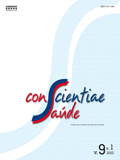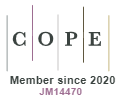Biocompatibility analysis of MTA, Portland cement and modified Portland cement on cultured fibroblast cells and subcutaneous tissue
DOI:
https://doi.org/10.5585/conssaude.v9i1.2121Palavras-chave:
Biocompatibilidade, Citotoxicidade, MTA, Cimento de Portland.Resumo
OBJECTIVES: This study evaluated the biocompatibility in vivo and in vitro of MTA (Pro-Root®), Portland cement and modified Portland cement (gypsum added). METHOD: For the in vivo analysis, polyethylene tubes were implanted subcutaneously in rats. After 7, 14, 30 and 60 days the tissue specimens were prepared for histological examination. For cytotoxic analysis the materials were placed in contact with NIH-3T3 cells. After 1, 3, 5 and 7 days, the cells viability was analyzed. RESULTS: The histological analysis showed moderate inflammatory response at 7 days in all groups. After 14 days the control group, MTA and Portland cement showed a mild inflammatory process while modified Portland group showed moderate inflammatory process. After 30 and 60 days all materials showed scarce inflammatory infiltrate and fibrosis. All the substances permitted the cell growth throughout the 7 days of experiment and presented similar cell viability. CONCLUSIONS: According to these experimental conditions, all the tested materials were biocompatible.Downloads
Não há dados estatísticos.
Downloads
Publicado
17.06.2010
Como Citar
1.
Fernandes KPS, Santos EM, Redá SH, Motta LJ, Bussadori SK, Teixeira VP, et al. Biocompatibility analysis of MTA, Portland cement and modified Portland cement on cultured fibroblast cells and subcutaneous tissue. Cons. Saúde [Internet]. 17º de junho de 2010 [citado 9º de novembro de 2024];9(1):11-6. Disponível em: https://uninove.emnuvens.com.br/saude/article/view/2121
Edição
Seção
Ciências básicas
Licença
Copyright (c) 2010 ConScientiae Saúde

Este trabalho está licenciado sob uma licença Creative Commons Attribution-NonCommercial-ShareAlike 4.0 International License.









